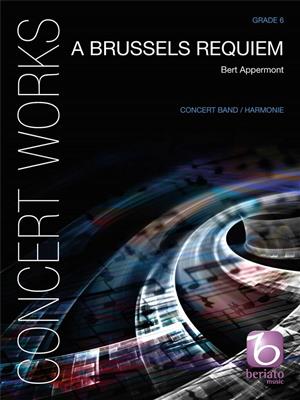Results
-
 £149.40
£149.40Selmas sang (Fra Snfall) - Thomas Stenersen
Snowfall is a 24-episodes advent TV-production for children, made by the Norwegian Broadcasting Corporation (NRK). It premiered on the 1st of December 2016. The main character in the series is the orphan Selma, a little girl that dreams of being somewhere else, somewhere better, together with her family. The song is full of hope and dreams for her future.
Estimated dispatch 7-14 working days
-
 £57.50
£57.50Fantasy on Korean Folk Songs
Exploring some of the most well-known traditional folk tunes from Korea, here is an appealing and well-paced suite for young players. Let's Sing and Dance starts slowly then gradually speeds up similar to how it is usually sung.The Gate is a song and game played by Korean children, and this is followed by the beautiful ballad Bellflowers. Finally The Palace completes the set in a bold and optimistic style. Dur: 3:55
Estimated dispatch 7-14 working days
-
 £134.99
£134.99I Colori della Gioia - Jan Van der Roost
This work for soprano and concert band was originally written for a special occasion: the wedding of one of the composer's children. It therefore matches another piece written for a similar occasion "I Shall Love But Thee". The lyrics are from the book Respiro Neve by the internationally renowned art photographer Luca Artioli who possesses poetic talent as well. The first movement is stately and serene as where the contrasting allegro is much more dynamic and cheerful, requiring the solid high register of the singer. The conclusion is festive and radiant, partly thanks to the contribution of a piccolo trumpet! This work is a wonderful addition to the bandrepertoire wanting to perform with an excellent vocal soloist!
Estimated dispatch 7-14 working days
-
 £274.99
£274.99A Brussels Requiem - Bert Appermont
The attacks in Brussels on 22 March 2016 created a shockwave throughout Belgium and the rest of the world. Equally, the attacks in Paris and Nice led to great public indignation, fear and disbelief.Bert Appermont's intention was to voice certain emotions that these acts of terror have caused: particularly fear, grief, anger, and helplessness. He uses the French children's song Au Clair de la Lune as a connecting thread throughout the work.
Estimated dispatch 7-14 working days
-
 £250.40
£250.40Le Petit Prince - Angelo Sormani
Musical tale for Narrator and Concert Band. "What is essential is invisible to the eye," tells the fox, and the little prince will repeat those words, which emphasize how anything can hide a treasure, a mystery to be unraveled. One must uncover the essence beyond appearances using the heart. The musical story The Little Prince, based on the famous work by Saint-Exupry, addresses both children and adults. Various levels of meanings make the story enjoyable for everyone and offer themes for reflection to people of any age. In the present work, the relationship between words and music creates the magic that accompanies the journey of the little prince among asteroids and planets. Wind band, narrator, and projection of images combine to make the performance a unique experience, which intimately ties narrative, expressive, and communicative aspects. Offered for Concert Band, the musical story The Little Prince, with its evocative and passionate features, will turn the concert into an unforgettable and emotional experience.People who buy this item, will receive a link to download for free the images to be projected during the show. Please contact us on [email protected] for more information.
Estimated dispatch 7-14 working days
-
 £104.99
£104.99In Memoriam - Bert Appermont
The terroristic attacks in Paris, Brussels, Nice and Berlin shocked many people and lead to fear, mistrust and unbelieve. To express these emotions, Bert Appermont composed a beautiful and sensitive In Memoriam.He used parts of the children's' song Au Claire de la Lune as a symbolic reference to the innocence that was suppressed by these events. He combined this with a lyrical melody which expresses the hope for a better world. A touching and reflective moment for your concert.
Estimated dispatch 7-14 working days
-
 £94.99
£94.99Children's Oak - Thierry Deleruyelle
Children's Oak was commissioned by the wind band from Beauquesne, France. This solemn work pays homage to a city particularly affected by the two World Wars and is inspired by the knowledge that the city of Beauquesne needed to recover from these terrible episodes in its history. The title has its origin in the roots of the word "Beauquesne", the beautiful oak tree. It is a beautiful slow piece for your concert, or as a resource to work on phrasing and intonation, or alternatively as a warm up piece.
Estimated dispatch 7-14 working days
-
 £47.50
£47.50The Fox - Béla Bartók
One of the numerous short piano pieces for children that Bla Bartk completed in a four-volume piano collection in 1909. This arrangement for early band students remains faithful to Bartk's intent while comfortably accommodating the skills for first year players. Light and whimsical, you can hear the playful nature of The Fox in this solid scoring for your beginners. (1:45)
Estimated dispatch 7-14 working days
-
 £127.40
£127.40Molak Molak - Thorbjørn Egner
This is one of the most famous melody and lyrics for children in the Nordic countries.The song is here arranged for childrens choir with concert band and also be performed as an instrumental arrangement without the choir.Thearrangement showcases the band's various sound-colours in a magnificent way!A recording of this arrangement is available on "Muntre musikanter" by Forsvarets Musikkorps Nord-Norge.
Estimated dispatch 7-14 working days
-
 £149.40
£149.40The Cardamom Song - Thorbjørn Egner
"The Cardamom song" is a very popular children's song in the Nordic countries. It's taken from the music and book "Folk og rvere i Kardemomme by" written by Thorbjrn Egner.This arrangement written in a latin style features a childrens choirwith concert band.The arrangement was written for the recording "Muntre musikanter Karius og Baktus mter dyrene I Afrika" by Forsvarets Musikkorps Nord-Norge.
Estimated dispatch 7-14 working days
